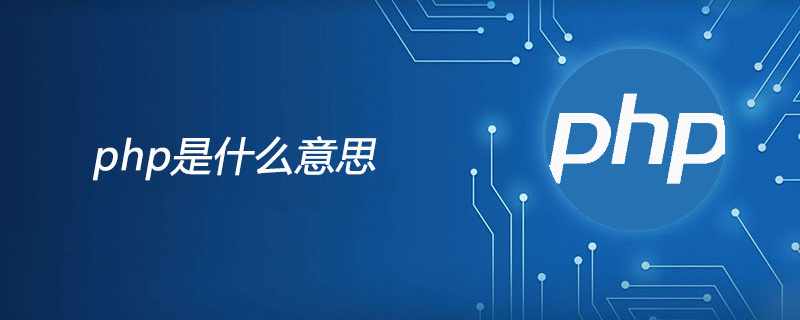Home >Backend Development >PHP Problem >what does php mean

PHP (foreign name: PHP: Hypertext Preprocessor, Chinese name: "Hypertext Preprocessor") is a general open source scripting language. The syntax absorbs the characteristics of C language, Java and Perl, which is easy to learn and widely used. It is mainly suitable for the field of Web development. PHP's unique syntax mixes C, Java, Perl, and PHP's own syntax. It can execute dynamic web pages faster than CGI or Perl. Compared with other programming languages, dynamic pages made with PHP embed programs into HTML (an application under the Standard Universal Markup Language) document for execution, and the execution efficiency is much higher than CGI that completely generates HTML tags; PHP can also execute compiled code. Compilation can achieve encryption and optimize code running, making the code run faster.
Development tools:
The integrated development environment is an integrated development environment that integrates the main tools required in the software development process. Its functions include but are not limited to code highlighting, code completion, Debugging, building, version control, and more. Some common PHP IDEs are as follows:
1. Zend Studio: Commercial version, officially produced by Zend, based on eclipse
2. Eclipse with PDT: Free
3. Coda: Commercial version, for Mac users
4, NetBeans: free, powerful
5, PHP Storm: commercial version
6, Aptana Studio: free
7. PhpEd: Commercial Edition
8. Komodo IDE/Edit: IDE is a commercial version, Edit is free to use
9. Adobe Dreamweaver: Commercial Edition
Remove integration Development environment, common text editors with code highlighting functions are often chosen as development tools because of their lightness and flexibility, such as: Notepad, Editplus, SublimeText, Everedit, etc.
Recommended study: "PHP Graphic Tutorial"
The above is the detailed content of what does php mean. For more information, please follow other related articles on the PHP Chinese website!